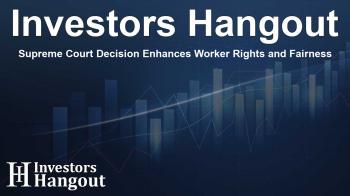Supreme Court Decision Enhances Worker Rights and Fairness

Supreme Court Ruling Elevates Standards of Fair Labor
In a significant ruling, the U.S. Supreme Court unanimously decided that disputes regarding overtime exemptions under the Fair Labor Standards Act (FLSA) should employ the "preponderance of the evidence" standard. This represents a more lenient standard compared to the previously applicable "clear and convincing" threshold. This landmark decision is a pivotal outcome that reinforces consistent standards which both businesses and employees can depend on in the framework of labor relations.
Implications of the Ruling on Businesses and Employees
The ruling is widely recognized as a victory for judicial consistency and fairness. Jeff Schwaber, a representative from Stein Sperling, expressed that this decision offers a renewed sense of balance in legal expectation. It assures that employers are not unfairly burdened while still safeguarding the rights of workers striving for adherence to labor regulations.
Case Background: EMD Sales Inc. v. Carrera
The Supreme Court case centered on whether three employees, categorized as outside salespeople, should receive overtime pay under the FLSA. The Court determined that exceptions from the basic evidentiary standard in civil cases are predominantly restricted to specific legislative, constitutional, or supreme precedents. Justice Brett Kavanaugh pointed out that “Other workplace protections that uphold essential public interests remain subject to the preponderance standard.”
Fighting for Fairness: The Legal Team
Stein Sperling Bennett De Jong Driscoll PC collaborated with co-counsel Williams & Connolly LLP to successfully advocate for their client, Elda Devarie, an entrepreneur and founder of a grocery distribution business. Elda's story embodies the spirit of persistence, reflecting countless small business owners who diligently adhere to labor laws. The successful ruling grants hope for more predictable legal environments benefiting everyone.
How the Ruling Affects Future Cases
The Supreme Court’s decision has broad ramifications nationwide, clarifying that the use of heightened evidentiary standards in labor law cases is out of step with overarching legal practices. Justice Neil Gorsuch emphasized that unless Congress changes the standards, courts must apply the default guidelines. This ruling decisively corrects discrepancies that have persisted, ensuring a fairer treatment of issues regarding labor law.
Supporting Workers and Businesses Alike
Eduardo Garcia, another co-counsel for EMD Sales Inc., articulated that the decision underscores a critical balance—protecting workers while allowing businesses to operate efficiently within legal boundaries. This careful equilibrium attracts attention, making strides in labor rights while maintaining a foundation for businesses to thrive in a fair competition landscape.
The Road to Justice
Tracing back to a lawsuit originating in 2017, the case illustrates the challenges employees face when fighting misclassification and ensuring equitable treatment in the workplace. Prior to Stein Sperling's involvement, a favorable district court ruling was possible, but the application of a higher evidentiary burden compromised the employees’ claims. The collaboration with Williams & Connolly aimed to challenge this precedent, and ultimately, the Supreme Court supported their efforts.
Public Interest and Legal Clarity
The Justice Department's amicus brief in support of the preponderance standard illustrated that this was not just a corporate matter but a public interest issue. The ruling contributes to the ongoing evolution of workplace protections throughout the country, affirming the U.S. judicial system's commitment to upholding fairness within labor relations.
Frequently Asked Questions
What was the Supreme Court's ruling regarding the FLSA?
The Supreme Court ruled that disputes over overtime exemptions under the Fair Labor Standards Act should be decided using the "preponderance of the evidence" standard.
Who was involved in the case?
The case involved EMD Sales Inc. and three employees who were classified as outside salespeople. The representatives included legal teams from Stein Sperling and Williams & Connolly.
What does the ruling mean for employees?
The ruling ensures that employees seeking overtime pay have a clearer path to demonstrating their claims, leading to fairer outcomes.
How does this ruling affect businesses?
Businesses can operate with more certainty regarding evidentiary standards in labor law, allowing for consistent application of laws without undue burdens.
Why is this ruling significant?
This ruling reinforces the importance of fairness in labor relations and clarifies standards, fostering a balanced legal environment for both employees and employers.
About Investors Hangout
Investors Hangout is a leading online stock forum for financial discussion and learning, offering a wide range of free tools and resources. It draws in traders of all levels, who exchange market knowledge, investigate trading tactics, and keep an eye on industry developments in real time. Featuring financial articles, stock message boards, quotes, charts, company profiles, and live news updates. Through cooperative learning and a wealth of informational resources, it helps users from novices creating their first portfolios to experts honing their techniques. Join Investors Hangout today: https://investorshangout.com/
Disclaimer: The content of this article is solely for general informational purposes only; it does not represent legal, financial, or investment advice. Investors Hangout does not offer financial advice; the author is not a licensed financial advisor. Consult a qualified advisor before making any financial or investment decisions based on this article. The author's interpretation of publicly available data presented here; as a result, they should not be taken as advice to purchase, sell, or hold any securities mentioned or any other investments. If any of the material offered here is inaccurate, please contact us for corrections.
